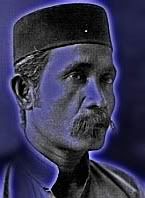Ramadhan Village
Ramadhan was always a cold month and the belly-aching pink mixture of sirap and condensed milk and crushed ice in a jug streaming with condensation beads. We sat and drank glasses of that to push down the nekbat or akök and sometimes both of them together, and then there was nasi ulam with herbs and leaves cut into fine shreds and mixed in rice with dollops of sambal and budu in discreet drops. Slabs of dates, from folk in Izmir, perhaps after they'd sat on them till they became compacted and ready to be wrapped and sent to be piled high in the front seat of Nana Yusof's Ramadhan shop. There were dates in bags as big as the rice guni, woven from leaves of exotic palms and filled with fruits unstoned and stalks steeped in the nectar of over-ripe fruit. Portions of agar-agar wrapped in newspapers, light as a maiden's touch, to be taken home and dropped in pots of boiling water, coloured and flavoured with pandan leaves and then set aside in moulds till they gelled in the colours of Eid.
Saws rasping on blocks of ice that came on the pedicabs, smaller blocks wrapped in newspapers lined with sawdust and rushed home for the iftar table to douse the heat of the day-long wait, and the chill it gave was the belly-aching feel of buka puasa, the breaking of fast. Puasa wasn't puasa without the kiddie entrepreneurs selling ice blocks from their roadside stalls. Stalls was perhaps a fancy Ramadhan word for children standing over mats of guni sacks lying on the tarmac's edge that had five and maybe a couple more blocks of ice sweating quietly in their coats of sawdust in the afternoon light.
Iftar started long before the actual time when the genta chimed and the cannon roared from distant hills. We sat — us under-aged fasters — in what must have been the longest half hour in the history of time around the low table in our dining room that looked out to the green leaves of the supple mminjas of Pök Wè and our local surau that punctuated the rhythm of our daily lives with the beats of the geduk. Our neighbour Ayöh Löh once woke up in his early Ramadhan morning stupor to beat the beats when dawn herself was still asleep and people were still at their sahur mats to eat their last meal before daybreak. When we looked out of the window we saw a comic tableau enacted in the half light of the surau steps: our Pök Wè with arms rolling back and forth in friendly banter and Ayöh Löh, scratching his tufted crown and mumbling something apologetic.
Even though children were exempted from the fast or allowed to do only a half day's worth, we were early fasters in our house and I remember tummy rumbling days in primary school and waiting hours in the playground shade thinking rocks of floating ice in a pink sea of condensed milk and sirap. We made our own sirap concentrate in our house, in a thin aluminium pot that Mother pulled out of the cupboard on Ramadhan's eve; and we watched as she poured sugar into boiling water, and red from out of a small bottle and then something called air èséng that gave us a whiff of other worlds and distant parts. In the blood-red sirap that was set aside to cool was always a coil of pandan leaf, heat-shrivelled and dead.
Èséng is 'essence' in Trengganuspeak, and it was of vanilla that Mother would have poured into her pot. And then, when all her work was done, she'd sit and pour the concoction into recycled Del Monte ketchup bottles, and stand them in a tray of water like palisades against the marauding semut*.
-------------------
* Ants

